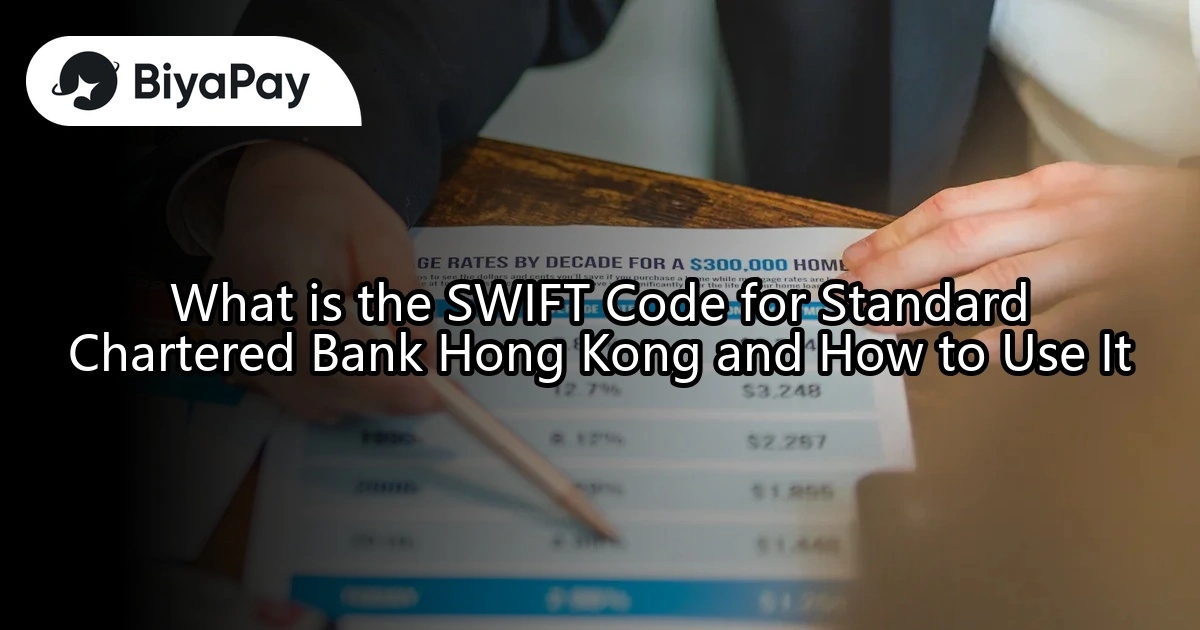- EasyCard
- Trade
- Help
- Announcement
- Academy
- SWIFT Code
- Iban Number
- Referral
- Customer Service
- Blog
- Creator
What is the SWIFT Code for Standard Chartered Bank Hong Kong and How to Use It

Image Source: pexels
When making international transfers, you must use the correct identification code. The SWIFT code for Standard Chartered Bank Hong Kong is SCBLHKHHXXX, which is the official code recognized for STANDARD CHARTERED BANK (HONG KONG) LIMITED on international transfer platforms like Wise. This code consists of bank, country, city, and branch information, ensuring funds are accurately delivered. It is recommended that you confirm the SWIFT code for Standard Chartered Bank Hong Kong with the recipient or bank again before transferring to ensure transaction safety.
Key Points
- The SWIFT code for Standard Chartered Bank Hong Kong is SCBLHKHHXXX, ensuring your international transfer reaches the designated bank and branch accurately.
- The SWIFT code is used for cross-border transfers, distinct from local bank codes, and the correct SWIFT code must be used for international transfers.
- Before transferring, prepare complete information, including the recipient’s name, account number, bank name, and SWIFT code, to avoid delays or returns.
- Choose the appropriate fee model (SHA, OUR, BEN) during the transfer and coordinate with the recipient to ensure clear fee allocation.
- Verify the SWIFT code and recipient details multiple times during the transfer process and retain the transfer receipt to ensure fund safety and successful receipt.
SWIFT Code Introduction

Image Source: unsplash
Definition and Structure
When making international transfers, you often encounter the SWIFT code. This is a code consisting of 8 to 11 characters, specifically used to identify banks worldwide. The SWIFT code, also known as BIC (Bank Identifier Code), has specific meanings for each part:
- Bank Code (4 letters): Represents the bank name, e.g., SCBL for Standard Chartered Bank.
- Country Code (2 letters): Indicates the bank’s country, e.g., HK for Hong Kong.
- Location Code (2 letters): Shows the city or region where the bank is located.
- Branch Code (3 letters, optional): Used to distinguish different branches; if omitted, it refers to the head office.
When using the SWIFT code for Standard Chartered Bank Hong Kong (e.g., SCBLHKHHXXX), these characters ensure funds are accurately delivered to the designated bank and branch. The SWIFT network provides a secure cross-border fund transfer system for banks, allowing you to conduct international financial transactions with confidence.
Tip: For wire transfers, you need to provide the SWIFT code, recipient account number, transfer currency, and amount to enable the bank to process your transaction accurately.
SWIFT vs. Local Bank Code
You may notice that the SWIFT code and Hong Kong local bank code differ significantly in purpose and structure:
- The SWIFT code is assigned by the SWIFT organization, mainly used for international transfers and cross-border financial transactions.
- The Hong Kong local bank code typically consists of only 3 digits, e.g., Standard Chartered Bank’s local code is “003,” applicable only for transfers between banks within Hong Kong.
- The SWIFT code has a more complex format, including bank, country, region, and branch information, with a length of 8 to 11 characters.
- The two cannot be used interchangeably. You must use the SWIFT code for international transfers and the local bank code for domestic transfers.
For example, the SWIFT code for HSBC Hong Kong head office is HSBCHKHH, while its local bank code is 004. You need to use the correct code in different scenarios to ensure funds are received smoothly.
Uses of Standard Chartered Bank Hong Kong SWIFT Code
Main Application Scenarios
When making international transfers, the SWIFT code for Standard Chartered Bank Hong Kong plays a crucial role. This code allows you to securely transfer funds from Hong Kong to destinations worldwide. By providing the correct SWIFT code, the bank can accurately identify the recipient bank, ensuring funds are neither lost nor delayed.
Common application scenarios include:
- You need to transfer money to family or friends overseas, e.g., from Hong Kong to the U.S., and the bank will require you to provide the SWIFT code for Standard Chartered Bank Hong Kong.
- When shopping online internationally or paying tuition fees, the recipient bank will also require you to provide the correct SWIFT code.
- When receiving international transfers from countries like China, the UK, or Australia in Hong Kong, the sending bank similarly needs this code to identify your bank.
Tip: When using online banking platforms or visiting a branch for international transfers, bank staff will remind you to provide the SWIFT code. This reduces errors and improves transfer efficiency.
You should note that the SWIFT code is only used for cross-border transfers. For transfers between local banks in Hong Kong, the SWIFT code is not required.
Branch Code Differences
You might assume that all transfers require only one SWIFT code, but different branches or services may sometimes have distinct SWIFT codes. The standard format for Standard Chartered Bank Hong Kong’s SWIFT code is SCBLHKHHXXX, where “XXX” represents the branch or specific department. If you only provide SCBLHKHH, the bank will default to the head office, but some branches or specific services (e.g., private banking, corporate banking) may have dedicated three-letter branch codes.
| Branch/Service | SWIFT Code |
|---|---|
| Head Office | SCBLHKHH |
| Central Branch | SCBLHKHH001 |
| Corporate Banking Department | SCBLHKHHBUS |
| Private Banking Department | SCBLHKHHPRV |
Before transferring, you should confirm the correct SWIFT code with the recipient. Using the wrong branch code may delay the receipt of funds or result in a return. You can check the correct SWIFT code on Standard Chartered Bank’s official website or by calling customer service.
Note: Some international transfer platforms (e.g., Wise) automatically display the SWIFT code for Standard Chartered Bank Hong Kong, but you should still verify the information provided by the recipient to ensure accuracy.
When handling large transfers (e.g., over USD 10,000), the bank may require more detailed branch information. This enhances transaction security and reduces the risk of funds being frozen or queried.
International Transfer Process

Image Source: unsplash
Required Information
When using the SWIFT code for Standard Chartered Bank Hong Kong for international transfers, you must prepare all relevant information. This information ensures the bank can process your transfer request accurately. You need to prepare the following items:
- Recipient’s full name (must match the registered name on the bank account)
- Recipient’s bank account number
- Recipient’s bank name and address
- Recipient’s bank SWIFT code (e.g., SCBLHKHHXXX)
- Transfer amount and currency (e.g., USD)
- Purpose of the transfer (required in some countries or regions)
- Your contact information (e.g., phone or email)
Tip: You can confirm all details with the recipient in advance to reduce delays or returns due to incorrect information.
You can refer to the following real-world cases to understand the importance of each step:
- Ms. C, a Taiwanese businesswoman, couldn’t personally handle the repatriation of property sale proceeds due to the pandemic. Through cross-border account opening, professional team collaboration, transfer fee discounts, and fast receipt services, funds were successfully repatriated, demonstrating the importance of convenience, efficiency, and cost control.
- Mr. A utilized cross-border account opening and VIP consultation services to reduce transfer waiting times and enjoy exchange rate discounts, highlighting the critical role of pre-verification and professional consultation in the transfer process.
- Cross-border RMB transfer services avoid exchange losses, ensure fast receipt, and offer fee waivers, specifically reflecting the impact of each step on fund safety, speed, and cost.
These cases illustrate that you must prepare carefully at every stage to ensure fund safety, fast receipt, and cost savings.
Operation Steps
You can process international transfers through an online banking platform or by visiting a branch. Below are the general operation steps:
- Log into your online banking account or visit a Standard Chartered Bank branch.
- Select “International Transfer” or “Overseas Transfer” service.
- Enter recipient details, including bank name, account number, and SWIFT code.
- Enter the transfer amount and select the currency (e.g., USD).
- Choose the fee model. Common options include:
- SHA (shared fees): You and the recipient each bear local bank fees.
- OUR (full amount received): You bear all fees, ensuring the recipient receives the full amount.
- BEN (recipient bears fees): The recipient bears all fees.
- Confirm the exchange rate. You can check the daily exchange rate before transferring, and some VIP clients may enjoy rate discounts.
- Verify all details and submit the transfer request.
- You will receive a confirmation notification and can track the transfer progress.
Note: When choosing the fee model, coordinate with the recipient to avoid misunderstandings due to fee allocation.
You can refer to the table below for a comparison of different fee models:
| Fee Model | Fees You Bear | Fees Recipient Bears | Full Amount Received |
|---|---|---|---|
| SHA | Local bank fees | Recipient bank fees | No |
| OUR | All fees | None | Yes |
| BEN | None | All fees | No |
Considerations
When processing international transfers, you should pay special attention to the following points:
- Confirm the SWIFT code for Standard Chartered Bank Hong Kong and recipient details are correct to avoid delays or returns.
- Be mindful of exchange rate fluctuations. Daily rate changes affect the actual amount transferred. You can choose to transfer when rates are favorable or inquire about rate discounts from the bank.
- Understand the fee structure. Fees vary by bank and transfer method, and some platforms may charge additional fees. Check all related fees in advance to avoid exceeding your budget.
- Note the source and purpose of funds. Some countries or regions have strict reviews of fund sources, so provide accurate purpose details to avoid funds being frozen or queried.
- Retain transfer receipts. Keep all transfer records and bank notifications for future inquiries or issue resolution.
According to the Bank for International Settlements, the average daily foreign exchange transaction volume in April 2019 reached USD 6.6 trillion. This massive transaction volume indicates the enormous scale of the international transfer market. When processing transfers, you must strictly manage fee structures and security risks to ensure fund safety and successful receipt.
Tip: Regularly check transfer progress and contact bank customer service immediately if you have concerns to ensure fund safety.
SWIFT Code Lookup and Common Questions
Lookup Methods
When looking for the correct SWIFT code, you should prioritize official bank information. You can log into Standard Chartered Bank’s online banking platform and find relevant details under “Recipient Management” or “International Transfer” pages. Bank statements, the official website, and customer service hotlines are the most direct inquiry channels. If you have doubts about the code, you can call the bank to confirm. You can also use SWIFT code search tools on regulated financial platforms like Wise, which are authorized by the UK Financial Conduct Authority and provide reliable information. Avoid relying on unofficial websites to prevent errors.
Tip: Verify the SWIFT code before each transfer to ensure fund safety.
IBAN Requirements
When making international transfers in Hong Kong, you typically only need to provide the SWIFT code and recipient account number. Hong Kong banks do not use the IBAN (International Bank Account Number) system. Some European or Middle Eastern banks may require IBAN, but Hong Kong bank accounts do not have an IBAN format. If the recipient requests an IBAN, you can explain that Hong Kong banks only provide account numbers and SWIFT codes to complete transfers.
Transfer Time and Restrictions
When processing international transfers, you often care about the time it takes for funds to arrive and amount restrictions. The following factors affect transfer speed:
- Banks impose limits on outgoing amounts, especially for Chinese banking operations, where transfers require multiple approvals, causing delays.
- For large transfer amounts, banks conduct detailed reviews of fund sources and transaction nature, and incomplete information extends processing time.
- Even if the fund source is legitimate, administrative approvals and waiting for higher-level reviews can slow down transfers.
- You need to prepare complete information to expedite the transfer process and reduce delays.
Generally, Hong Kong banks process international transfers in 1 to 3 business days. During public holidays or reviews, the time may extend. You should plan in advance to avoid impacts on fund flow due to amount restrictions or insufficient information.
When making international transfers, you must use the SWIFT code correctly. You should carefully look up and verify the SWIFT code for Standard Chartered Bank Hong Kong and note branch differences. By preparing complete information and following transfer considerations, you can ensure fund safety and successful receipt.
Tip: Confirm all details before each transfer to reduce the risk of errors.
FAQ
1. Can You Use the Same SWIFT Code to Receive Transfers from Different Countries?
Yes. By providing the correct SCBLHKHHXXX and account number, funds from different countries can be transferred to your Standard Chartered Bank Hong Kong account.
2. What Happens if the SWIFT Code and Bank Name Don’t Match During a Transfer?
The bank will suspend processing your transfer. Ensure the SWIFT code and bank name match exactly, or funds may be returned.
3. How Much Are International Transfer Fees?
Typically, international transfer fees range from USD 20 to 40 per transaction, depending on the amount, destination, and exchange rate. Check with the bank for the latest fees.
4. Can You Use the SWIFT Code to Track Transfer Progress?
No. You need to use the transfer reference number provided by the bank or contact customer service to check progress. The SWIFT code is only used to identify the bank.
5. Can You Use the SWIFT Code to Transfer Directly to a Credit Card?
No. The SWIFT code is only applicable to bank accounts. You need to provide a valid bank account number and cannot transfer directly to a credit card.
International remittances enable global fund transfers, but high fees of 20-40 USD and complex processes, along with time-consuming investment account setups, hinder efficiency. BiyaPay offers an all-in-one financial platform for seamless cross-border fund management! Users can trade US and HK stocks in real-time without an overseas bank account, managing global markets with one account. Remittance fees are as low as 0.5%, covering 190+ countries with same-day fund transfers. The flexible savings product yields a 5.48% annualized return, with daily interest credited automatically. It supports real-time conversion of 30+ fiat currencies and 200+ cryptocurrencies, secured by KYC verification.
Try BiyaPay now to start your global investment journey! Pair with top brokers and join BiyaPay today at BiyaPay for efficient remittances and steady returns!
*This article is provided for general information purposes and does not constitute legal, tax or other professional advice from BiyaPay or its subsidiaries and its affiliates, and it is not intended as a substitute for obtaining advice from a financial advisor or any other professional.
We make no representations, warranties or warranties, express or implied, as to the accuracy, completeness or timeliness of the contents of this publication.




Contact Us
Company and Team
BiyaPay Products
Customer Services
is a broker-dealer registered with the U.S. Securities and Exchange Commission (SEC) (No.: 802-127417), member of the Financial Industry Regulatory Authority (FINRA) (CRD: 325027), member of the Securities Investor Protection Corporation (SIPC), and regulated by FINRA and SEC.
registered with the US Financial Crimes Enforcement Network (FinCEN), as a Money Services Business (MSB), registration number: 31000218637349, and regulated by FinCEN.
registered as Financial Service Provider (FSP number: FSP1007221) in New Zealand, and is a member of the Financial Dispute Resolution Scheme, a New Zealand independent dispute resolution service provider.




















